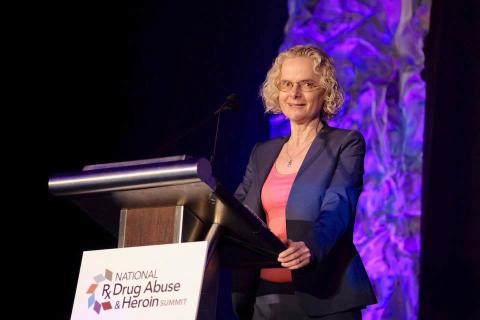NIH Launches HEAL Initiative to Stem Opioid Epidemic

Photo: Chris Williams Zoeica Images
At the 2018 National Rx Drug Abuse and Heroin Summit on Apr. 4 in Atlanta, NIH director Dr. Francis Collins announced the launch of the HEAL (Helping to End Addiction Long-term) Initiative.
HEAL is an aggressive, trans-agency effort to speed scientific solutions to stem the national opioid public health crisis. NIH is nearly doubling funding for research on opioid misuse/addiction and pain from approximately $600 million in fiscal year 2016 to $1.1 billion in fiscal year 2018, made possible by a funding boost from Congress.
“Every day, more than 115 Americans die after overdosing on opioids,” said Collins. “That is a four-fold increase since 2000, and the numbers continue to climb. NIH has been deeply invested in efforts to counter this crisis through research, but we are determined to do even more.
“Over the last year,” he continued, “NIH has worked with stakeholders and experts across scientific disciplines and sectors to identify areas of opportunity for research to combat the opioid crisis. The focus of these discussions has centered on ways to reduce the over-prescription of opioids, accelerate development of effective non-opioid therapies for pain and provide more flexible options for treating opioid addiction. NIH is committed to bringing the full power of the biomedical research enterprise to bear on this crisis.”

Photo: Chris Williams Zoeica Images
HEAL will bolster research across NIH to prevent addiction through enhanced pain management and improve treatments for opioid misuse disorder and addiction.
“Science and technology have illuminated our understanding of the mechanisms underlying addiction,” said Dr. Nora Volkow, director of the National Institute on Drug Abuse, who also attended the summit. “With these additional resources, we can develop more customized, high-quality treatments for addiction and pain, as well as harness implementation science to bring evidence-based changes to our health care system, including treatment for those in the criminal justice environment.”
HEAL will build on extensive, well-established NIH research that has led to successes such as the development of the nasal form of naloxone, the most commonly used nasal spray for reversing an opioid overdose; the development of buprenorphine for the treatment of opioid use disorder; and the use of nondrug and mind/body techniques to help patients control and manage pain, such as yoga, tai chi, acupuncture and mindfulness meditation.
The initiative also will tap into the expertise of the NIH Pain Consortium, which was established to enhance collaboration among NIH institutes, centers and offices that conduct pain research.
For more information about HEAL, visit https://www.nih.gov/heal-initiative.
